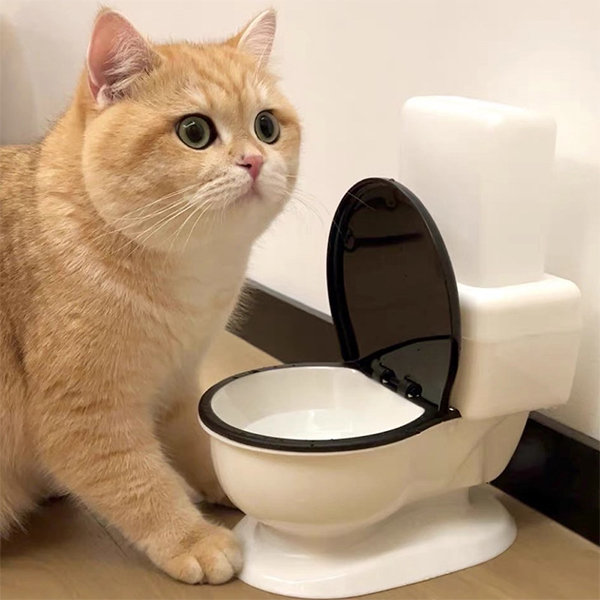How do you really feel about Don’t flush cat feces down the toilet?

Intro
As pet cat proprietors, it's important to be mindful of exactly how we take care of our feline buddies' waste. While it may appear convenient to purge pet cat poop down the toilet, this practice can have detrimental effects for both the setting and human health and wellness.
Environmental Impact
Purging feline poop presents damaging microorganisms and parasites into the water, posing a significant risk to water ecosystems. These pollutants can adversely affect marine life and compromise water top quality.
Wellness Risks
In addition to ecological issues, flushing feline waste can additionally position health risks to people. Feline feces may consist of Toxoplasma gondii, a parasite that can trigger toxoplasmosis-- a possibly severe health problem, specifically for expectant females and individuals with damaged immune systems.
Alternatives to Flushing
Fortunately, there are much safer and extra liable ways to dispose of cat poop. Consider the following options:
1. Scoop and Dispose in Trash
The most usual technique of disposing of feline poop is to scoop it right into a biodegradable bag and throw it in the garbage. Make sure to utilize a specialized clutter scoop and take care of the waste immediately.
2. Use Biodegradable Litter
Choose naturally degradable pet cat litter made from materials such as corn or wheat. These litters are eco-friendly and can be safely disposed of in the trash.
3. Hide in the Yard
If you have a lawn, consider burying feline waste in an assigned location away from vegetable yards and water resources. Be sure to dig deep adequate to avoid contamination of groundwater.
4. Mount a Pet Waste Disposal System
Invest in a family pet garbage disposal system particularly created for feline waste. These systems use enzymes to break down the waste, decreasing smell and ecological influence.
Final thought
Liable animal possession prolongs beyond providing food and sanctuary-- it additionally entails appropriate waste administration. By refraining from flushing cat poop down the commode and going with alternative disposal methods, we can minimize our ecological impact and secure human health and wellness.
Why Can’t I Flush Cat Poop?
It Spreads a Parasite
Cats are frequently infected with a parasite called toxoplasma gondii. The parasite causes an infection called toxoplasmosis. It is usually harmless to cats. The parasite only uses cat poop as a host for its eggs. Otherwise, the cat’s immune system usually keeps the infection at low enough levels to maintain its own health. But it does not stop the develop of eggs. These eggs are tiny and surprisingly tough. They may survive for a year before they begin to grow. But that’s the problem.
Our wastewater system is not designed to deal with toxoplasmosis eggs. Instead, most eggs will flush from your toilet into sewers and wastewater management plants. After the sewage is treated for many other harmful things in it, it is typically released into local rivers, lakes, or oceans. Here, the toxoplasmosis eggs can find new hosts, including starfish, crabs, otters, and many other wildlife. For many, this is a significant risk to their health. Toxoplasmosis can also end up infecting water sources that are important for agriculture, which means our deer, pigs, and sheep can get infected too.
Is There Risk to Humans?
There can be a risk to human life from flushing cat poop down the toilet. If you do so, the parasites from your cat’s poop can end up in shellfish, game animals, or livestock. If this meat is then served raw or undercooked, the people who eat it can get sick.
In fact, according to the CDC, 40 million people in the United States are infected with toxoplasma gondii. They get it from exposure to infected seafood, or from some kind of cat poop contamination, like drinking from a stream that is contaminated or touching anything that has come into contact with cat poop. That includes just cleaning a cat litter box.
Most people who get infected with these parasites will not develop any symptoms. However, for pregnant women or for those with compromised immune systems, the parasite can cause severe health problems.
How to Handle Cat Poop
The best way to handle cat poop is actually to clean the box more often. The eggs that the parasite sheds will not become active until one to five days after the cat poops. That means that if you clean daily, you’re much less likely to come into direct contact with infectious eggs.
That said, always dispose of cat poop in the garbage and not down the toilet. Wash your hands before and after you clean the litter box, and bring the bag of poop right outside to your garbage bins.
https://trenchlesssolutionsusa.com/why-cant-i-flush-cat-poop/

I discovered that blog post about Can You Flush Cat Poop Down The Toilet? while exploring the internet. Those who appreciated our page please make sure you remember to share it. Thanks a bunch for your time. Don't hesitate to check our website back soon.
Visit Our Site